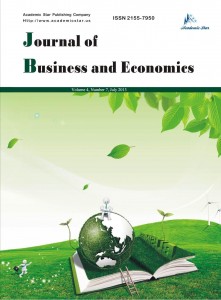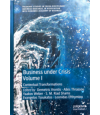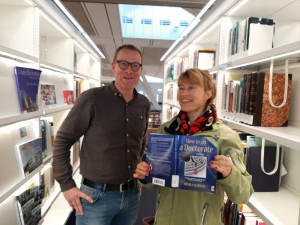



https://www.researchgate.net/publication/366222612_An_Overview_of_Business_Advancement_Through_Technology_Digitalisation_of_Love_and_Lies_on_Online_Dating_Platforms_in_Coronavirus_Times_Business_Advancement_Through_Technology
What is the success of Airbnb in terms of ‘Responsible Leadership’ and ‘Uncertainty Avoidance’?
https://www.researchgate.net/publication/364449703_What_is_the_success_of_Airbnb_in_terms_of_’Responsible_Leadership’_and_’Uncertainty_Avoidance’
Responsible Leadership, Airbnb and Ikigai and Uncertainty Avoidance
LOVE AND TRUST PROPENSITY ON ONLINE DATING PLATFORMS IN THE TIME OF CORONAVIRUS
LOVE IN THE TIME OF CORONAVIRUS
https://www.researchgate.net/publication/354676780_LOVE_IN_THE_TIME_OF_CORONAVIRUS
Responsible Leadership And Non-Uncertainty Avoidant (UA) Companies in Luxembourg
Responsible Leadership and Uncertainty Avoidance As New Taboo Dimension in Luxembourg
“I am a Responsible Leader” Responsible Corporate Social Responsibility: The Example of Luxembourg
Schroever, Sander (2020) (Editor). Mapping Global Leadership. Cross-cultural analyses of leadership styles and practices. Amsterdam University of Applied Sciences. minorccbs.com CCBS-Press
https://books.google.lu/books?id=WsDoDwAAQBAJ&pg=PA187&lpg=PA187&dq=mapping+global+leadership&source=bl&ots=moPWReF5oq&sig=ACfU3U0ZUYoN7vN3jAvTLhhlH1VjR6ikSA&hl=en&sa=X&ved=2ahUKEwitlrLz7PbpAhWCsaQKHd21D_UQ6AEwE3oECAsQAQ#v=onepage&q=mapping%20global%20leadership&f=false
Rezensionen
Nutzerrezensionen
Dear reader: I have read most of the book, and I was taken from the first page on until the last page, in one day! In fact, this is the best and most comprehensive coverage of recent leadership practices around the globe. Plus, the combination of empirical approaches with qualitative and quantitative approaches make this book a real scholarly gem! The part on Luxemburg with Dr Ursula Schinzel and Rita Knott really stands out, as it shows the unique impact of the Luxemburgish culture, which is an unconventional compilation of several subcultures coexisting in a small country, on responsible leadership. In this unusual and peculiar time of Corona Virus, with lockdowns, travel bans and social distancing, the book shows, that despite all of these limitations, collaboration, research, friendship, academic work and leadership don’t stop, as apparently there are no borders, no limits to any of them. On the contrary, this work is a testimony of cross-cultural collaboration against all odds. I wholeheartedly wish you enjoyable reading!
Detelin Elenkov (Ph.D. ’92, Massachusetts Institute of Technology)
At last a cross-cultural book that uses non-US approach to the study of culture and leadership. The book includes both theory and practice of leadership in 24 countries, of which only four (Belgium, Czech Republic, France and Luxembourg) are included in the Organization for Economic Cooperation and Development (OECD) list, and the rest are developing countries such as Azerbaijan, Cameroon, Dominican Republic, Moldova, and Guyana, countries for which there are very limited data about leadership. Moreover, the book could be used in both research and undergraduate level university instruction, as well as by practitioners and decision makers in the studied countries. The book’s findings were generated by the use of three methods of data collection, namely, literature survey, actual in-country questionnaire surveys, and experts’ advice by 48 academics and practitioners who experience living, working and teaching in these countries.
The following information is presented for each of the twenty four countries surveyed and described in the book: Country introduction; how the local nationals describe their leaders; survey and interviews results; in-country youtube review; summary of telephone interviews with local leadership experts; summary of video interviews with local cross-cultural trainers; a list of host country most popular books about leadership; analysis of hierarchy and its implications for human behavior; and recommendations for empathetic leadership approach.
The book has been compiled by experienced instructors of cross-cultural leadership and the data contributed by many others at one university, a testimony for what a collaborative efforts can yield. It is a great asset in any library, on-line or private collection.
Moshe Banai, PhD, Professor Emeritus, Baruch College, CUNY, USA.
Mapping Global Leadership – the newest book from University of Amsterdam for Applied Sciences – a cross-cultural comparison among countries, not by the USA, but by other countries around the globe, also including an interesting and in-depth analysis of one of the smallest countries, a country – Luxembourg – known by few if not for a superficial idea of a rich, clean and bourgeois country nestled in the centre of Europe.
The study reveals, following CCBS online questionnaire survey, and interviews with Dr Ursula Schinzel and Rita Knott, surprising aspects such as the enormous diversity of socio-cultural attitudes due to the multicultural aspect and above all the country’s ability to seize opportunities for the well-being of all.
While remaining proud of their being Luxembourgish, the natives are open to welcoming new cultures and ways of thinking in an environment of respect for rules shared by all.
It is interesting to note that the different cultures implanted in Luxembourg also create an excellent osmosis with the local culture.
I recommend reading this book to discover some surprising aspects for 24 countries worldwide, and especially about Luxembourg, a small country that could be considered a cultural laboratory.
This is a review of my own work. For the purpose of this book, I was interviewed to talk about leadership style in Luxembourg. The outcome of so many interviews around the world is now available in form of this book from Amsterdam University of Applied Sciences and CCBS (Cross-Cultural Business Skills). It is to be said that I am especially proud of being part of this book, an excellent collection of CCC : ‘Cross-Cultural Comparison’. Reading it is fun, really fun, because it is current, it is interesting, it is compelling, and represents a moment in time, before the outbreak of the Corona Virus pandemic. Cross-Cultural Comparison has been forever my dearest research. Thinking back when I was in school, 15 years old, participating in my first school exchange with Great Britain, and the next year with France, when I was 16 years old. Indeed, telling my stories about my stays in the exchange families, and seeing my listeners interests, this was fascinating, and then writing about my diverse experiences, while living, studying, working in different countries of Europe, the USA and Africa and Australia…. when travelling was not yet fashion, and then everybody started travelling, not only me, and now nobody travels because of the COVID-19 pandemic travel stop.
This book is amazing, an outstanding collection, and hopefully not the end, hopefully this research will continue and more people will contribute to more ‘storytelling of cross-cultural comparison. Enjoy the reading. Thank you for reading my stories.
Dr Ursula Schinzel
‘Mapping Global Leadership’ is a collection of leadership styles in different countries, where 125 students from the module ‘Cross-Cultural Business Skills’ at Amsterdam University of Applied Sciences interviewed leaders and distributed questionnaires. My daughter was interviewed by one of the scholars during the Corona Virus lockdown period, via skype interview and collaboration was virtual to make corrections and clarifications. A remarkable work! Good luck with the reading!
Brunhilde Schinzel
Schinzel, U. (2020) (Hrsg.). Unicaf University Annual Conference in Cape Town, South Africa, Saturday, 30 August 2019. In: Reise, reise! Ausflüge – Fahrten – Impressionen. Ausgabe 25. Frieling Verlag Berlin 2016. ISBN 978-3-8280-3547-8.
My books in ‘Bibliothèque Nationale de Luxembourg’
Schinzel, U. (2019). Sports in Luxembourg. Frieling Verlag Berlin August 2019. ISBN 978-3-8280-3480-8.
Schinzel, U. (2019). Is Uncertainty Avoidance The New Taboo Dimension? Responsible Leadership and Uncertainty Avoidance Index UAI) in Luxembourg. In: Vrontis, D., Weber, Y, and Tsoukatos, E. (eds): Conference Proceedings 12th Annual Conference of the EuroMed Academy of Business. Business Management Theories and Practices in a Dynamic Competitive Enviroonment. EuroMed Press, pp. 1145-1180. ISSN: 2547-8516. ISBN xxxxxxxxxxxx
Schinzel, U. (2018). Chambre 2016. In: Die Grossen Themen Unserer Zeit. Autoren im Dialog. Frieling Verlag Berlin August 2018, pp. 135-141. ISBN 978-3-8280-3487-7
Schinzel, U. (2019). Paris Stadt der Kontraste. In: Reise, reise! Ausflüge – Fahrten – Impressionen. Ausgabe 22. Frieling Verlag Berlin 2016. ISBN 978-3-8280-3485-3.
Schinzel, U. (2019). “I am a Responsible Leader” Responsible Corporate Social Responsibility: The Example of Luxembourg. Business Perspectives and Research, pp. 1–15, © 2019 K.J. Somaiya Institute of Management Studies and Research, Reprints and permissions: in.sagepub.com/journals-permissions-india DOI: 10.1177/2278533719860019 journals.sagepub.com/home/bpr
https://journals.sagepub.com/doi/10.1177/2278533719860019
https://journals.sagepub.com/eprint/BTUVTBFZ8BJD5NXERNDJ/full
https://trvision.net/detail/dr-ursula-schinzel-responsible-leadership-and-corporate-social-responsibility-in-luxembourg-mxc0qVYRdoM.html
Schinzel, U. (2019). Responsible Leadership and Non-Uncertainty Avoidant (UA) Companies in Luxembourg. Journal of Strategic and International Studies, Volume XIV Number 3, 2019, pp. 5-20, ISSN_2326-3636.
Schinzel, U. (2019). Responsible Leadership and Uncertainty Avoidance as new Taboo Dimension in Luxembourg. Journal of Strategic and International Studies, Volume XIV Number 1, 2019, pp. 26-39, ISSN_2326-3636.
Schinzel, U. (2018). I am a Responsible Leader! In: Vrontis, D., Weber, Y, and Tsoukatos, E. (eds): Conference Proceedings 11th Annual Conference of the EuroMed Academy of Business. Research Advancements in National and Global Business Theory and Practice. EuroMed Press, pp. 1075-1100. ISSN: xxxxxxxxxxx. ISBN xxxxxxxxxxxx
Schinzel, U. (2018). Online Education. In: Die Grossen Themen Unserer Zeit. Autoren im Dialog. Frieling Verlag Berlin August 2018, pp. 133-137. ISBN 978-3-8280-3455-6
Schinzel, U. (2018). Responsible Leadership and Corporate Social Responsibility (CSR) in Luxembourg. International Journal of Organizational Analysis, Emerald, Volume 26, issue 3, pp.415-431, https://doi.org/10.1108/IJOA-09-2017-1241 Accepted for publication on 04Oct2017. Available at: https://www.emeraldinsight.com/eprint/D6YHJPYFGESUPFQQ2U2T/full
Schinzel, U. (2018) Leadership in Luxembourg – What would be smart? Journal of Strategic and International Studies, Volume XIII Number 4, 2018, pp. 5-14. ISSN 2326-3636.
Schinzel, U. (2018) What is the Link between Corporate Social Responsibility and Responsible Leadership in Luxembourg? Journal of Strategic and International Studies, Volume XIII Number 4, 2018, pp. 38-47. ISSN 2326-3636
Schinzel, U. (2017). What is Smart Leadership in Luxembourg? In: Vrontis, D., Weber, Y, and Tsoukatos, E. (eds): Conference Proceedings 10th Annual Conference of the EuroMed Academy of Business. Global and national business theories and practice: bridging the past with the future. EuroMed Press, pp. 1579-1611. ISSN: 2547-8516.
Schinzel, U. (2017). Responsible and Smart Leadership in Luxembourg? Journal of Advancements in Applied Business Research, Volume VI Number 2, 2017, pp. 5-13. ISSN 2332-0311.
Schinzel, U. (2017). Key West 2017 Florida – Sunshine State. In: Reise, reise! Ausflüge – Fahrten – Impressionen. Ausgabe 22. Frieling Verlag Berlin. ISBN 978-3-8280-3344-3.
Schinzel, U. (2017). Three official languages in multicultural Luxembourg. World Review of Entrepreneurship, Management and Sustainable Development, Vol. 13, No. 5/6, pp.471-491. DOI: 10.1504/WREMSD.2017.10004846
Schinzel, U. (2017). Responsible and Smart Leadership in Luxembourg? Journal of Advancements in Applied Business Research, Volume VI Number 2, 2017, pp. 5-13. ISSN 2332-0311. JAABR_Volume_VI_Number_2_2017_ISSN_2332-0311_Schinzel_publication
Schinzel, U. (2017). What is Responsible – What is Irresponsible Leadership in Luxembourg? Journal of Strategic and International Studies, Volume XII Number 1, 2017, pp. 12-23. ISSN 2326-3636. JSIS_Volume_XII_Number_1_2017_ISSN_2326-3636_Schinzel_Leadership_publication
Schinzel, U. (2017). How to Educate Multicultural Managers? The Example of Luxembourg. in: Rozkwitalska, M., Sulkowski, L. & Magala, S. (Ed) (2016) Intercultural Interactions in the Multicultural Workplace. Springer Verlag. http://www.springer.com/gp/book/9783319397702
Schinzel, U. (2016). Expatriates in Luxembourg: How to Cope with Cultural and Linguistic Specificities? Journal of Business and Economics, Vol. 7, Nr. 1, January 2016. NY: New York. ISSN 2155-7950. DOI:10.15341/jbe(2155-7950)/01.07.2015/005 JBE 2016-1_Expatriates_in_Luxembourg
Elenkov, D., and Schinzel, U. (2016). 2016 ACADEMIC OASIS/ IAABR – MIAMI BEACH INTERNATIONAL ACADEMIC CONFERENCE PROCEEDINGS. 2016 MIAMI BEACH CONFERENCE PROCEEDINGS
Schinzel, U. (2015). Impact of National Culture on e-Recruitment Practices in Luxembourg. World Review of Entrepreneurship, Management and Sustainable Development, Vol. X, Nos. Y, pp.xxx-xxx. DOI: 10.xxxx/WREMSD.xxxxxxx (UPCOMING)
Schinzel, U. (2015). An analysis of cultural shifts – the examples of Luxembourg, France, Germany. World Review of Entrepreneurship, Management and Sustainable Development, Vol. 11, Nos. 2/3, pp.308–326. DOI: 10.1504/WREMSD.2015.068586
Schinzel, U. (2015). Expat Destination Luxembourg: Hell Or Paradise?. Journal of Strategic and International Studies, Volume X Number 6, 2015, pp. 32-42. ISSN 2326-3636. JSIS_2015_Vol_X_Nr_6_Schinzel_Expat_Destination_Luxembourg_Hell_or_Paradise
Schinzel, U. (2015). Educating Tri-Cultural Managers in Luxembourg. Journal of Psychology and Social Studies, Vol IX Number 5, pp.23-31, 20015. ISSN 2327-7017. JPSS_2015_Vol_IX_Nr_5_Schinzel_Educating_Tri-Cultural_Managers_in_Luxembourg
Sharp, P., and Schinzel, U. (2015). Innovative Use of Knowledge for Personal Development. Journal of Strategic and International Studies, Volume X Number 3, 2015, pp. 32-42. ISSN 2326-3636. JSIS_2015_Vol_X_Nr_3_Sparp_Schinzel_Innovative_Use_of_Knowledge_for_Personal_Development
Schinzel, U. (2015). Why Networks Are Beneficial for Micro-Foundations in Cross-Cultural Environments. Journal of Strategic and International Studies, Volume X Number 2, 2015. ISSN 2326-3636. JSIS_2015_Vol_X_Nr_2_Schinzel_Why_Networks_Are_Beneficial_For_Micro_Foundations
Schinzel, U. (2015). E-Recruitment in Luxembourg? Journal of Strategic and International Studies, Volume X Number 1, 2015. ISSN 2326-3636. JSIS_2015_Vol_X_Nr_1_Schinzel_e-Recruitment_in_Luxembourg
Schinzel, U. (2014). Multinational – multicultural – multilingual Luxembourg – a system of integration – or – a system of failure? Journal of Strategic and International Studies, Volume IX Number 6, 2014. ISSN 2326-3636. JSIS_2014_Vol_IX_Nr_6_Schinzel_Multilingual_Luxembourg_Integration_or_Failure
Schinzel, U. (2014). Hofstede in Luxembourg. Intercultural comparison of Luxembourg-France-Germany. Journal of Strategic and International Studies, Volume IX Number 6, 2014. ISSN 2326-3636. JSIS_2014_Vol_IX_Nr_6_Schinzel_Hofstede_in_Luxembouerg_Intercultural_Comparison_F_G_L
Schinzel, U. (2015). Multilingual or failed? Is the Trilingual Luxembourgish Public Education System a Failure or a Success Story? Journal of Business and Economics, Vol. 6, Nr. 3, March 2015. NY: New York. ISSN 2155-7950. DOI:10.15341/jbe(2155-7950)/03.06.2015/016; http://www.academicstar.us/issuelist.asp?ArtID=371&issid=485; http://www.academicstar.us/issueshow.asp?daid=1130
Schinzel, U. (2015). Hofstede in Luxembourg. Journal of Business and Economics, Vol. 6, Nr. 2, February 2015. NY: New York. ISSN 2155-7950. DOI:10.15341/jbe(2155-7950)/02.06.2015/012; http://www.academicstar.us/issuelist.asp?ArtID=371&issid=486;
http://www.academicstar.us/issueshow.asp?daid=1109
Schinzel, U. (2015). It’s the Network, stupid. Journal of Business and Economics, Vol. 6, Nr. 1, January 2015. NY: New York. ISSN 2155-7950. DOI:10.15341/jbe(2155-7950)/01.06.2015/014; http://www.academicstar.us/issuelist.asp?ArtID=371&issid=487; http://www.academicstar.us/issueshow.asp?daid=1089
Schinzel, U. (2014). Who wants digital HRM? Journal of Business and Economics, Vol. 5, Nr. 12, December 2014, pp. 2374-2390. NY: New York, USA. ISSN 2155-7950. DOI:10.15341/jbe(2155-7950)/12.05.2014/018; http://www.academicstar.us/issuelist.asp?ArtID=371&issid=421; http://www.academicstar.us/issueshow.asp?daid=1065
Schinzel, U. (2015). India is Market – Fascinating India, in : Reise, reise! Ausflüge – Fahrten – Impressionen. Frieling-Verlag. 2015. ISBN 978-3-8280-3286-6.
Schinzel, U. (2014). Quelles compétences à l’international – Luxembourg, France, Allemagne. Frieling-Verlag. May 2014. ISBN 978-3-8280-3217-0.
Schinzel, U. (2013). How to get a Doctorate – and more – with Distance Learning/Online. – Frieling-Verlag. March 2013. ISBN 978-3-8280-3128-9.
Schinzel, U. (2013). Why are People in Luxembourg Happy? Language as an Identifier of Culture in the Grand Duchy. Journal of Customer Behaviour, Vol. 12, Nr. 4, pp. 315-340. ISSN 1475-3928. JCB-Schinzel-authorcopy
__________________________________
http://econpapers.repec.org/article/idswremsd/
http://econpapers.repec.org/article/idswremsd/v_3a11_3ay_3a2015_3ai_3a2_2f3_3ap_3a308-326.htm
http://www.inderscience.com/offer.php?id=68586
World Review of Entrepreneurship, Management and Sustainable Development
2015 Vol. 11 No. 2/3
Special Issue on Entrepreneurship and Management Answers to Selected Interdisciplinary Topics in Difficult Times
Guest Editors: Dr. Ursula Schinzel and Dr. Amiram Porath
| Pages | Title and authors | |
| 129-136 | Political and military action frame of the European Union in crises management Corneliu Balta; Gheorghe Bica; Diana Nicoleta Rosioru DOI: 10.1504/WREMSD.2015.068574 |
|
| 137-155 | Stimulating entrepreneurship by teaching accounting: concept and implementation Anna Białek-Jaworska; Renata Gabryelczyk DOI: 10.1504/WREMSD.2015.068575 |
|
| 156-171 | Innovation and knowledge management in a knowledge-based economy Gheorghe Bică; Mădălina Constantinescu; Elena Bică DOI: 10.1504/WREMSD.2015.068576 |
|
| 172-185 | Emerging from crisis with new approaches to science of society Aurelian Bondrea; Larisa Mihoreanu; Carmen Costea; Adrian Vasile DOI: 10.1504/WREMSD.2015.068577 |
|
| 186-199 | An exploratory investigation on new product development in family luxury businesses Stefano Bresciani; Bernardo Bertoldi; Chiara Giachino; Alberto Ferraris DOI: 10.1504/WREMSD.2015.068578 |
|
| 200-216 | Strategic R&D internationalisation in developing Asian countries – the Italian experience Stefano Bresciani; Alkis Thrassou; Demetris Vrontis DOI: 10.1504/WREMSD.2015.068579 |
|
| 217-231 | Consequences of investment contract duration on the valuation of firms in maturity stage Madalena Delgado; Renato Pereira; Álvaro Dias DOI: 10.1504/WREMSD.2015.068580 |
|
| 232-246 | Knowledge-intensive entrepreneurship and performance during the crisis: cases of the Greek wood industry Glykeria Karagouni DOI: 10.1504/WREMSD.2015.068581 |
|
| 247-266 | A quality management model for integrated healthcare in Poland Iga Rudawska; Hans Ruediger Kaufmann DOI: 10.1504/WREMSD.2015.068582 |
|
| 267-281 | Monetary and financial policies: a dynamical model approach Ion Viorel Matei; Laura Ungureanu; Eduard Ionescu DOI: 10.1504/WREMSD.2015.068583 |
|
| 282-295 | Analysing wellbeing at the crossroads of socioeconomic growth and business ethics Larisa Mihoreanu; Laura Oana Goran; Tania Georgia Viciu DOI: 10.1504/WREMSD.2015.068584 |
|
| 296-307 | Different approaches to technology transfer by government and academy Amiram Porath; Isabel Ramos; Hakikur Rahman DOI: 10.1504/WREMSD.2015.068585 |
|
| 308-326 | An analysis of cultural shifts – the examples of Luxembourg, France, Germany Ursula Schinzel DOI: 10.1504/WREMSD.2015.068586 |
|
World Review of Entrepreneurship, Management and Sust. Development, Vol. 11, Nos. 2/3, 2015 125 Copyright © 2015 Inderscience Enterprises Ltd.
Editorial Ursula Schinzel* 22, Rue Adolphe Fischer, L-1520 Luxembourg, Luxembourg Email: ursula_schinzel@yahoo.com *Corresponding author
Amiram Porath 18 Ela Street, Bat-Hefer 4284200, Israel Email: amirampster@gmail.com
The call for papers for this guest edition allowed the collection of papers from a very diverse range of salient entrepreneurial and managerial topics in economic difficult times in the beginning of the 21st century. The global challenges for entrepreneurs and management alike are triggered by increased levels of globalisation, internationalisation or cross-cultural issues. This calls for effective entrepreneurial, managerial and societal crisis management implying paradigm changes in strategy, marketing and e-marketing, human resources, quality management or knowledge transfer. Solutions require adequate learning and training facilities with new pedagogic concepts as well as selected political and social solutions reflecting comprehensive approaches to emerging crises, which are provided by this guest edition. Furthermore, innovative concepts and methods to stimulate entrepreneurship, aiming to contribute to increased levels of wellbeing, quality, and sustainability, and last but not least to financial security. The papers’ research settings are located in different European and associated countries and cover topics which are perceived to be currently under-researched: healthcare in Poland, online laboratory for learning accounting in Poland, family luxury businesses in Italy, the Greek wood and furniture sector, wellbeing at the crossroads of socio-economic growth, technology transfer models in Israel and Portugal, cultural shifts in Luxembourg. Reflecting the holistic character of the guest edition, solutions are also suggested for crisis management in the European Union, including political and military actions. As to methodological aspects, the guest edition embraces papers that are empirically, conceptually or case study based, representing an interesting mixture intended to bring topics to discussion rather than to conclusions. The diversified nature of this contextual mixture is intended to reflect the diversified nature of challenges of the European entrepreneurial and management arena calling for concerted actions. The topics mentioned above cover sectors from low-tech to high tech, from public research organisations to commercial firms covering the diversified cultural and geographical scenes in the EU. The following briefly introduces the respective papers’ contents: (U. Schinzel and A. Porath )
• ‘Political and military action frame of the European Union in crises management’ by Corneliu Balta, Gheorghe Bica and Diana Nicoleta Rosioru
This study researches the European Union (EU), who is one of the dynamic non-state players on the world scene in relation to the crises and conflict management. As a result, it activates by voluntary conjecture of a hefty assortment of political and military roles for preventing and resolving the predicaments and clashes, which can come about in the European space or adjoining its strategic neighbourhood.
• ‘Stimulating entrepreneurship by teaching accounting: concept and implementation’ by Anna Białek-Jaworska and Renata Gabryelczyk
This study aims to present an idea for the implementation of an educational programme to usher students towards entrepreneurship through an integrated process approach, illustrating business operations with real accounting documents and bookkeeping, using ERP and IT modelling and process analysis tools. The proposed approach will enable students to develop an understanding of the business environment and allow them to obtain some practical experience in accounting.
• ‘Innovation and knowledge management in a knowledge-based economy’ by Gheorghe Bică, Mădălina Constantinescu and Elena Bică
The main objective of this research is to provide a comprehensive view of the current state of research and practices regarding the development of the knowledge-based economy: innovation as a key driver in wealth creation; how to maximise creativity and innovation in any individual, organisation, region or economy. Another objective of the paper addresses the context of how information technology (IT) can aid the transformation process of knowledge.
• ‘Emerging from crisis with new approaches to science of society’ by Aurelian Bondrea, Larisa Mihoreanu, Carmen Costea and Adrian Vasile
The study of complex systems, evolutionary economics and interdisciplinary research offers the possibility of new developments. The recurrence of economic crises serves to illustrate the limits of neoclassical economics and the contemporary established models. Modern-day economic developments are highly influenced by the theory of complexity. Complex systems research represents the viable alternative for sustainable growth in the following decades. The concept of emergence represents an insightful argument against the well-planned and ordered nature of the social sciences universe.
• ‘An exploratory investigation on new product development in family luxury businesses’ by Stefano Bresciani, Bernardo Bertoldi, Chiara Giachino and Alberto Ferraris
This research aims at investigating the relationship between family and products in the luxury sector, in order to understand if and how, the family affects the success of the company. 19 family businesses were interviewed, operating in the luxury sector discovering that the involvement of the family and its essence are deeply anchored in the core business of the company. Firms need to quickly and timely anticipate competitors’ next moves, monitor market tastes, adapt their products and properly communicate their positioning. Products often remain faithful to the style impressed by the family.
• ‘Strategic R&D internationalisation in developing Asian countries – the Italian experience’ by Stefano Bresciani, Alkis Thrassou and Demetris Vrontis
The aim of this paper is to show R&D internationalisation activities of firms from Italy in Asian developing countries. Using a dataset of 500 Italian firms with international R&D units, as well as interviews, it was researched whether companies follow a knowledge augmenting or knowledge sourcing strategy. The results show a positive relation between the choice to settle R&D units in Asia and the sale of innovative products in Asia, concluding that firms follow a knowledge exploiting strategy, establishing their whole innovation value chain to developing Asian countries.
• ‘Consequences of investment contract duration on the valuation of firms in maturity stage’ by Madalena Delgado, Renato Pereira and Álvaro Dias
Variables influencing investment contract duration were studied by investigating the performance of mature Portuguese firms that have been (partially) held by venture capital funds. Evidence was found that sales growth, exports, book value, headcount and a good coverage of ISO standards implementation influenced the investment contract duration.
• ‘Knowledge-intensive entrepreneurship and performance during the crisis: cases of the Greek wood industry’ by Glykeria Karagouni
The study approaches the relationship between knowledge-intensive entrepreneurship (KIE) in low-tech, traditional sectors and environmental instability from the perspective of the long severe financial crisis in Greece, of the wood industry in Greece, which led to a drastic economic downturn.
• ‘A quality management model for integrated healthcare in Poland’ by Iga Rudawska and Hans Ruediger Kaufmann
The objective of this paper is to identify the indicators of a quality management model for integrated healthcare settings in Poland. In order to elicit the items and clusters of quality management, a three-step methodology has been applied: a literature review, a Delphi study, and concept mapping.
• ‘Monetary and financial policies: a dynamical model approach’ by Ion Viorel Matei, Laura Ungureanu and Eduard Ionescu
This study presents a dynamic model for monetary policy. The model emphasises both the principal interdependence settled between system variables (real stock of money, rate of inflation) and the variation of these in relation to the parameters values.
• ‘Analysing wellbeing at the crossroads of socioeconomic growth and business ethics’ by Larisa Mihoreanu, Laura Oana Goran and Tania Georgia Viciu
The study tries to enquire the characteristics of individual and national wellbeing towards both the role and effects of corruption as corrosion element, to determine the manner in which these influence each other, and how they impact decisions of business planners and policymakers. 128 U. Schinzel and A. Porath
• ‘Different approaches to technology transfer by government and academy’ by Amiram Porath, Isabel Ramos and Hakikur Rahman The paper presents the conflict between the natural preference of technology transfer organisations (TTO) regarding commercialisation for the licensing option and the government preference for spin-offs.
• ‘An analysis of cultural shifts – the examples of Luxembourg, France, Germany’ by Ursula Schinzel
The purpose of this research is to investigate the cultural shifts in Hofstede’s cultural dimensions Individualism, Power Distance, Uncertainty Avoidance, Masculinity, Long-Term Orientation, Indulgence versus Restraint, and Monumentalism in Luxembourg, France and Germany.
Summarising, this guest edition is an eclectic collection of papers treating current diverse entrepreneurial and management challenges and opportunities. We, the guest authors, wish you interesting reading.
_______________________________________________________
My Publications in: Journal of Strategic and International Studies
Volume IX Number 6 2014 ISSN2326-3636
see here: JSIS_MANILA_Online_November_2014_my_2_publications
Volume X Number 2 2015 ISSN2326-3636
see here: JSIS_KEY_WEST_Volume_X_Number_2_2015_ISSN_2326-3636_Schinzel_1_publication
Volume X Number 1 2015 ISSN2326-3636
see here: JSIS__Miami_Volume_X_Number_1_2015_Schinzel_1_publication
click also on:
http://www.academia.edu/10677024/Journal_of_Strategic_and_International_Studies
Volume IX Number 6 2014 ISSN2326-3636
see here: JSIS_ORLANDO_Volume_IX_Number_6_November_2014_ISSN_2326-3636_Schinzel_2_publications – Copy
_________________________________________________________

My Publications in: Journal of Business and Economics
see here my publications:
______________________________________________________________
1) “Who wants digital HRM? The example of Luxembourg”
Volume 5, Number 12, December 2014:
DOI:10.15341/jbe(2155-7950)/12.05.2014/018
http://www.academicstar.us/issuelist.asp?ArtID=371&issid=421
http://www.academicstar.us/issueshow.asp?daid=1065
ABSTRACT
Who Wants Digital HRM? The Example of Luxembourg
_____________________________________________________________
2)”It’s the network – stupid!”
Volume 6, Number 1, January 2015
DOI:10.15341/jbe(2155-7950)/01.06.2015/014
http://www.academicstar.us/issuelist.asp?ArtID=371&issid=487
http://www.academicstar.us/issueshow.asp?daid=1089
ABSTRACT
It’s the Network—Stupid!
_____________________________________________________________
3) “Hofstede in Luxembourg”
Volume 6, Number 2, February 2015
DOI:10.15341/jbe(2155-7950)/02.06.2015/012
http://www.academicstar.us/issuelist.asp?ArtID=371&issid=486
http://www.academicstar.us/issueshow.asp?daid=1109
ABSTRACT
Hofstede in Luxembourg
______________________________________________________________
4) “Multilingual or failed? Is the Trilingual Luxembourgish Public Education System a Failure or a Success Story?”
Volume 6, Number 3, March 2015
DOI:10.15341/jbe(2155-7950)/03.06.2015/016
http://www.academicstar.us/issuelist.asp?ArtID=371&issid=485
http://www.academicstar.us/issueshow.asp?daid=1130
___________________________________________________________
Multilingual or Failed? Is the Trilingual Luxembourgish Public Education
System a Failure or a Success Story?
ABSTRACT
business; language; trilingual public education system; Luxembourg
JEL code: F
Multilingual or Failed by Dr Ursula Schinzel
_____________________________________________________________
JBE_Vol.1_Nr1_January2015_Ursula_Schinzel
Multilingual or Failed by Dr Ursula Schinzel
_________________________________________________________-
I published in Journal of Customer Behaviour
see here: http://www.ingentaconnect.com/content/westburn/jcb/2013/00000012/00000004/art00004?crawler=true
Journal of Customer Behaviour, Volume 12, Number 4, Winter 2013 , pp. 315-340(26)
Why are people in Luxembourg happy? An exploratory study of happiness and culture measured by the dimension of a language as identifier in the Grand Duchy
Author: Schinzel, Ursula
Source: Journal of Customer Behaviour, Volume 12, Number 4, Winter 2013 , pp. 315-340(26)
Publisher: Westburn Publishers Ltd
Price: $25.61 plus tax (Refund Policy)
Abstract:
The purpose of this study is to explain Luxembourg people’s high scores on the measure of happiness by looking into the relationship between happiness and culture, as measured by the command of a language. More specifically, Hofstede’s dimensions of culture, ‘Individualism/Collectivism’, ‘Power Distance’, ‘Masculinity/Femininity’, ‘Uncertainty Avoidance’, ‘Long-Term Orientation/Short-Term Orientation’, ‘Indulgence versus Restraint’ and ‘Monumentalism’, as well as ‘Happiness’, (Diener & Lucas, 2000) are measured and calculated by obtaining responses from 134 employees who work at Lindab Buildings in Luxembourg, France and Germany. No significant differences were found between Hofstede’s estimates for the dimensions of culture in Luxembourg and his scores for Germany, and the current study’s results for Lindab in Luxembourg and Germany. Differences were found between Hofstede’s and Lindab results for France and for Luxembourgers who command the Luxembourgish language, indicating that language is an identifier of culture. Pearson Correlations were calculated, where Happiness was found to be related to Indulgence and to Long-Term Orientation. Discussion, implications, limitations, and future research suggestions follow.
Keywords: CROSS-CULTURAL MANAGEMENT; DIMENSIONS OF CULTURE; HAPPINESS; LANGUAGE; LUXEMBOURG;VALUES
Document Type: Research Article
DOI: http://dx.doi.org/10.1362/147539213X13875568505822
Publication date: December 1, 2013
- ___________________________________________________________
http://www.frieling.de/unsere-autoren/archive/ursula-schinzel/?searchterm=schinzel*
Die großen Themen unserer Zeit (2014)
|
|
Der lebendige Austausch über gesellschaftlich und politisch relevante Themen ist für eine Demokratie maßgebend. Deshalb liegt dem Frieling-Verlag Berlin ein offener und engagierter Dialog zu den richtungsweisenden Themen unserer Zeit am Herzen. In dem kritischen Sammelband Die großen Themen unserer Zeit • Autoren im Dialog bekennen Autorinnen und Autoren politisch Farbe, beziehen zu aktuellen Fragen Stellung und prangern gesellschaftliche Missstände an. Dabei werden bewusst auch kontroverse Sichtweisen veröffentlicht. Der erste Teil des vorliegenden Bandes umfasst Beiträge zum Schwerpunktthema „Ist die Humanität am Ende?“ In diesem Thementeil setzen sich Autorinnen und Autoren auf formal und inhaltlich vielfältige Art mit den Grundlagen unserer Gesellschaft und unserer Menschlichkeit auseinander. Sie berichten von eigenen Erlebnissen und Erfahrungen als Helfende in unterschiedlichen Situationen, beleuchten die Situation in fernen Ländern und erörtern die philosophischen, sozialen und religiösen Aspekte der Hinwendung zum Mitmenschen. Dem schließen sich im zweiten Teil Beiträge zu weiteren gesellschaftlich relevanten Themen an. So bietet der Band einen facettenreichen Blick auf den Zustand der Welt, in der wir leben. Johann-Friedrich Huffmann (Hrsg.):
Die großen Themen unserer Zeit (2014)
Autoren im Dialog. Mit Beiträgen zum Schwerpunktthema „Ist die Humanität am Ende?“
Reihe: Anthologien
192 Seiten, Taschenbuch (Paperback)
EUR 10,00 · ISBN 978-3-8280-3229-3
|
http://www.frieling.de/unsere-autoren/archive/ursula-schinzel
A B C D E F G H I J K L M N O P Q R S T U V W X Y Z
Ursula SchinzelUrsula Schinzel, Doctorate in Business Administration, studied international business, management, human resources and economics in London (UK), Paris (France), Saarbrücken (Germany) and in the USA. Since nearly 20 years she held different positions in leading American and European multinational corporations in the Grand Duchy of Luxembourg. For the last 30 years she has been sports instructor with several sport clubs and since 20 years with Sports pour Tous, Ville de Luxembourg. Dr Ursula Schinzel publishes articles and books and delivers lectures at conferences in German, English, French, Italian and Luxembourgish. Publikationen von Ursula Schinzel: How to get a Doctorate – and moreA personal and private guide for both students and supervisors
Quelles compétences pour réussir à l’international ? – ou – Pourquoi les luxembourgeois sont-ils heureux ?Comparaison interculturelle Luxembourg–France–Allemagne
|



